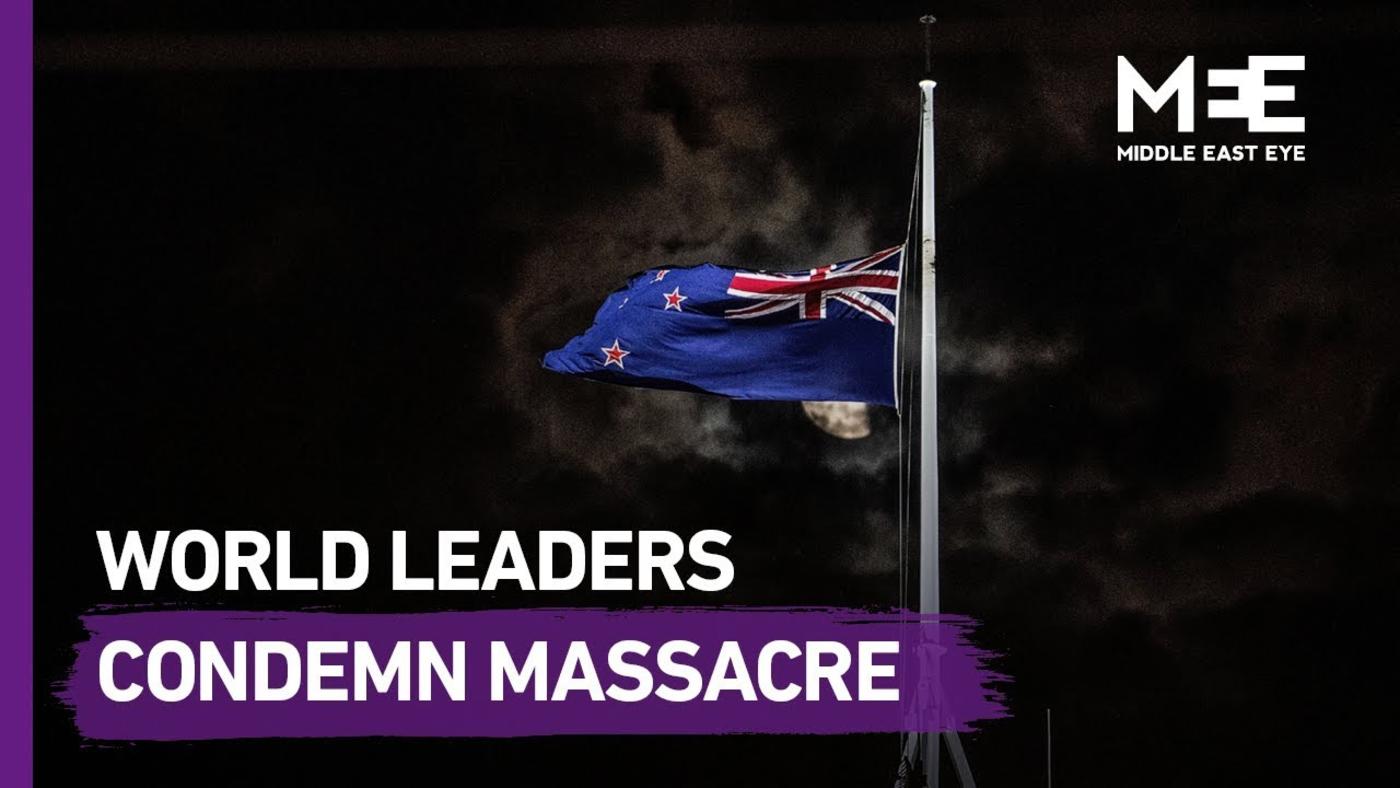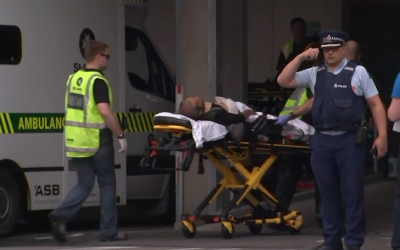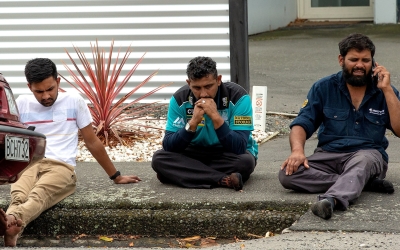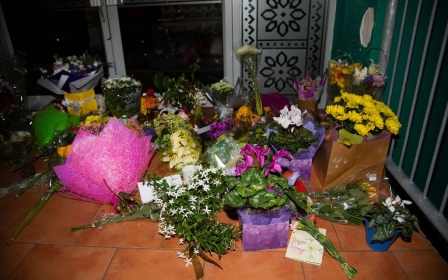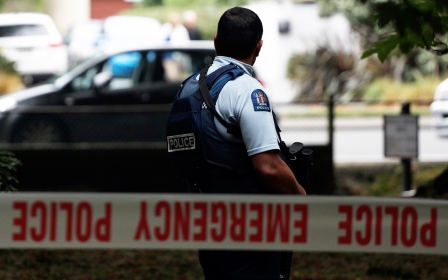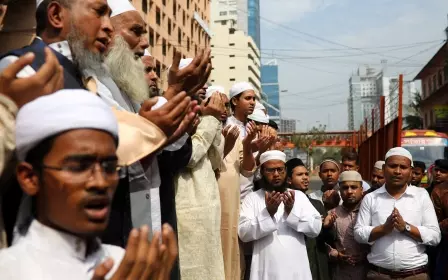New Zealand mosque attacks 'fuelled by white supremacist legacy'
Australia and New Zealand’s legacy of white supremacy, coupled with an unchecked Islamophobic political and media landscape, were contributing factors to Friday's attacks on two mosques in Christchurch, analysts have told Middle East Eye.
At least 49 people were shot dead and dozens more injured in the attacks which targeted worshippers taking part in Friday prayers in the city on New Zealand's South Island.
Police have arrested four people in connection with the attacks, which media reports suggest were carried out by a man with an assault rifle who broadcast live footage of the shootings online and also published a manifesto on the internet in which he claimed to be acting in order to preserve the white race.
New Zealander Sahar Ghumkor, an academic based in Melbourne, Australia, who specialises in Islamophobia, said that media and politicians in New Zealand and Australia must take some responsibility for the way they have presented Islam to the public.
“Today’s massacre reveals the utter irresponsibility of media and politicians who we must acknowledge have had a role to play in the way people have come to perceive Muslims and Islam,” she said.
Ghumkor said that authorities had ignored calls to tackle growing Islamophobia, even though “studies are consistently showing an increasing hostile sentiment by the public towards Muslims, and linking media coverage to informing these sentiments".
The foreignness of Islam and Muslims is a consistent media trope, said Ghumkor, pointing out that New Zealand Prime Minister Jacinda Arden’s statement in response to the attacks also implied that Muslims were foreigners.
Speaking in the aftermath of the attacks, Arden said: "Many of those who will have been directly affected by this shooting may be migrants to New Zealand, they may even be refugees here. They have chosen to make New Zealand their home, and it is their home."
Ghumkor said: “We saw an example of the foreignness of Muslims in the Prime Minister’s initial statements in response to the massacre by emphasising the migrant and refugee status of the community in a tone of constant welcome.”
The suspected mosque attacker is believed to be behind a 74-page document titled "The Great Replacement" in which he describes himself as a 28-year-old Australian male.
He also writes that his reasons for carrying out the attack include revenge for “hundreds of thousands of deaths caused by foreign invaders in European lands throughout history” and the alleged enslavement of “millions of Europeans” by Muslims.
'White fantasies of victimisation'
Yassir Morsi, a politics lecturer at La Trobe University in Melbourne, said that the attacks were the result of “racism and ongoing white supremacy”, linking the racist nature of the attack and manifesto to Australia's and New Zealand’s legacy of oppression of their own aboriginal peoples.
“At the end of the day, both nations are the result of white settler colonialism and that has throughout the last two centuries created a sense of what it means to be both Aussie and Kiwi and those meanings are White,” he said, using a colloquial term to refer to New Zealanders.
“These countries share in white fantasies and white mythologies about their victimisation and their entitlement to the land, history and the truth.”
Morsi said that “hysteria around the Muslim threat” is inherited both from global conversations but also because of the mainstreaming of dangerous ideas that has given the far-right “permission to hate".
“White supremacy is hinged on the idea that they are victims first and so with mainstream society showing less vigilance, or in some cases sharing ideas about problems of immigrants and the loss of western culture, they've had a lot of permission to hate.”
Morsi pointed out that the Australian government’s offshore detention policies, which have seen asylum seekers sent to Pacific islands while their applications are processed, and its firm backing since the 2001 9/11 attacks in the US for the Washington-led "war on terror" has contributed to a climate of exclusion and othering.
“Anti-terror legislation allows politicians to dog whistle and point the finger at the Muslim community, that can create and generate media attention to the supposed threat that lies within the Muslim community.” he said.
“It is nearly 20 years since 9/11, a period in which Muslims have had every aspect of their lives questioned debated, disputed, contested, and securitised and ultimately it brought the worst out of the society, and that worst wasn't too far below the surface.”
Cycle of violence
Moazzam Begg, the outreach director for the UK-based Cage, an advocacy group representing people affected by counter-terrorism policies, said: “Anti-Muslim sentiment is not confined to the far-right but lives in the respectable halls of parliament, press rooms and academia."
He warned that a cycle of violence was “spiralling out of control” as politicians refused to acknowledge their part in stoking “white supremacist nativist thought”.
Samayya Afzal, a British community activist, said that that frequent references in the manifesto to the UK, including "Brexit", child sex exploitation cases and threats against London Mayor Sadiq Khan “show that this is not far removed from ourselves".
Afzal added that British Prime Minister Theresa May also failed in her statement condemning the attack to acknowledge the “vulnerability and specific targeting of Muslims praying inside a mosque.”
“The simplest way to describe this is an utter denial of our humanity,” she said.
Middle East Eye delivers independent and unrivalled coverage and analysis of the Middle East, North Africa and beyond. To learn more about republishing this content and the associated fees, please fill out this form. More about MEE can be found here.


